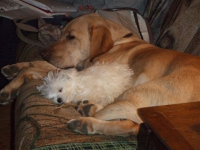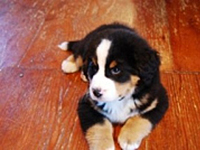This surgery removes the testicles from the scrotum, thereby removing the major source of testosterone as well as the ability to make sperm. The best time to castrate is between 4 and 6 months of age for both kittens and puppies.
The positive side of castrating : unwanted puppies and kittens, prevention of testicular cancer, castrated dogs are much less likely to lift their leg and mark, much less likely to roam, and much less interested in fighting.
Check In: We usually ask you to drop your pet off during the morning between 8 and 8:30 am on an empty stomach (no food past 6pm the night before, but water is OK). Please take your dog for a walk in the morning to use the bathroom. We will ask you to sign a consent form allowing anesthesia to be used and ask if you are interested in pre-anesthetic blood work, pain medication and a microchip for your animal. Additional costs may include extraction of retained baby teeth, ear cleaning and treatment of fleas.
We will have you call the office between 1:00 and 2:00 to check in and we can update you on their condition and let you know their pick-up time.
Check Out: When you arrive to pick up your animal we will have your bill ready, any medications needed and instructions on home care. You will need to keep your pet "quiet" for 7 to 10 days, which means leashed walks only to go out to the bathroom, no swimming or bathing and no licking at the incision. A follow-up appointment generally is not needed as the sutures are under the skin and are absorbable.
What to expect when your pet goes home: After taking him home, he may be groggy from the anesthesia, so watch him closely around stairs and jumping on beds and couches. Please wait till he can "walk a straight line" before feeding and start off with small amount of food and water. Pain medication can be given if he feels ready to eat. Contact office if there is any swelling, excess redness or "weeping" at surgical site.




















